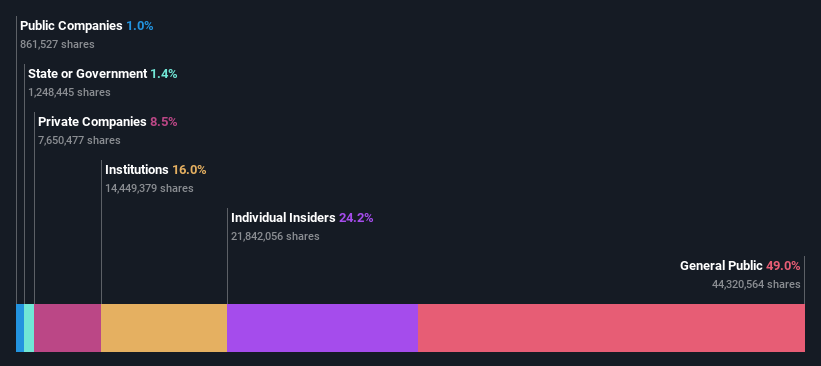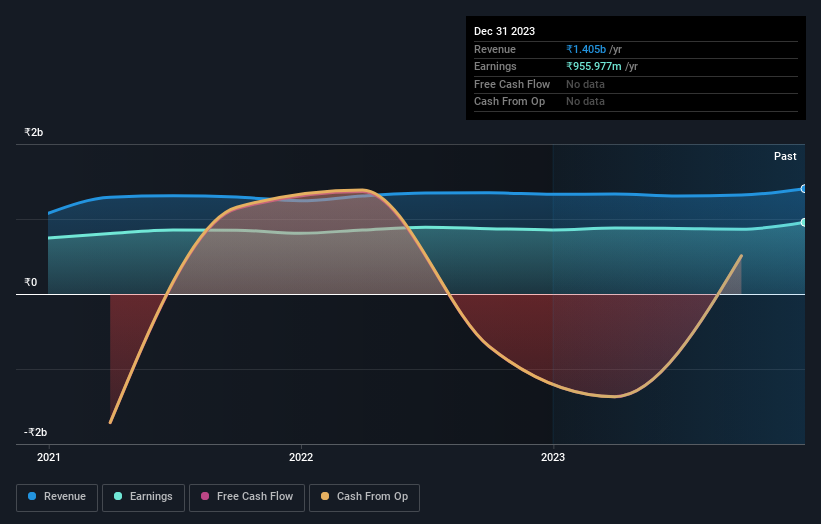Stock Analysis
- India
- /
- Diversified Financial
- /
- NSEI:TFCILTD
Retail investors invested in Tourism Finance Corporation of India Limited (NSE:TFCILTD) copped the brunt of last week's ₹2.9b market cap decline

Key Insights
- Significant control over Tourism Finance Corporation of India by retail investors implies that the general public has more power to influence management and governance-related decisions
- The top 18 shareholders own 50% of the company
- Insiders have sold recently
A look at the shareholders of Tourism Finance Corporation of India Limited (NSE:TFCILTD) can tell us which group is most powerful. And the group that holds the biggest piece of the pie are retail investors with 49% ownership. In other words, the group stands to gain the most (or lose the most) from their investment into the company.
While the holdings of retail investors took a hit after last week’s 16% price drop, insiders with their 24% also suffered.
In the chart below, we zoom in on the different ownership groups of Tourism Finance Corporation of India.
Check out our latest analysis for Tourism Finance Corporation of India

What Does The Institutional Ownership Tell Us About Tourism Finance Corporation of India?
Many institutions measure their performance against an index that approximates the local market. So they usually pay more attention to companies that are included in major indices.
Tourism Finance Corporation of India already has institutions on the share registry. Indeed, they own a respectable stake in the company. This implies the analysts working for those institutions have looked at the stock and they like it. But just like anyone else, they could be wrong. When multiple institutions own a stock, there's always a risk that they are in a 'crowded trade'. When such a trade goes wrong, multiple parties may compete to sell stock fast. This risk is higher in a company without a history of growth. You can see Tourism Finance Corporation of India's historic earnings and revenue below, but keep in mind there's always more to the story.

Hedge funds don't have many shares in Tourism Finance Corporation of India. Aditya Halwasiya is currently the company's largest shareholder with 13% of shares outstanding. For context, the second largest shareholder holds about 4.1% of the shares outstanding, followed by an ownership of 3.4% by the third-largest shareholder.
Looking at the shareholder registry, we can see that 50% of the ownership is controlled by the top 18 shareholders, meaning that no single shareholder has a majority interest in the ownership.
While it makes sense to study institutional ownership data for a company, it also makes sense to study analyst sentiments to know which way the wind is blowing. As far as we can tell there isn't analyst coverage of the company, so it is probably flying under the radar.
Insider Ownership Of Tourism Finance Corporation of India
The definition of an insider can differ slightly between different countries, but members of the board of directors always count. Management ultimately answers to the board. However, it is not uncommon for managers to be executive board members, especially if they are a founder or the CEO.
Insider ownership is positive when it signals leadership are thinking like the true owners of the company. However, high insider ownership can also give immense power to a small group within the company. This can be negative in some circumstances.
Our information suggests that insiders maintain a significant holding in Tourism Finance Corporation of India Limited. Insiders own ₹3.7b worth of shares in the ₹15b company. This may suggest that the founders still own a lot of shares. You can click here to see if they have been buying or selling.
General Public Ownership
With a 49% ownership, the general public, mostly comprising of individual investors, have some degree of sway over Tourism Finance Corporation of India. This size of ownership, while considerable, may not be enough to change company policy if the decision is not in sync with other large shareholders.
Private Company Ownership
Our data indicates that Private Companies hold 8.5%, of the company's shares. Private companies may be related parties. Sometimes insiders have an interest in a public company through a holding in a private company, rather than in their own capacity as an individual. While it's hard to draw any broad stroke conclusions, it is worth noting as an area for further research.
Next Steps:
It's always worth thinking about the different groups who own shares in a company. But to understand Tourism Finance Corporation of India better, we need to consider many other factors. To that end, you should learn about the 4 warning signs we've spotted with Tourism Finance Corporation of India (including 2 which are potentially serious) .
Of course this may not be the best stock to buy. Therefore, you may wish to see our free collection of interesting prospects boasting favorable financials.
NB: Figures in this article are calculated using data from the last twelve months, which refer to the 12-month period ending on the last date of the month the financial statement is dated. This may not be consistent with full year annual report figures.
Valuation is complex, but we're helping make it simple.
Find out whether Tourism Finance Corporation of India is potentially over or undervalued by checking out our comprehensive analysis, which includes fair value estimates, risks and warnings, dividends, insider transactions and financial health.
View the Free AnalysisHave feedback on this article? Concerned about the content? Get in touch with us directly. Alternatively, email editorial-team (at) simplywallst.com.
This article by Simply Wall St is general in nature. We provide commentary based on historical data and analyst forecasts only using an unbiased methodology and our articles are not intended to be financial advice. It does not constitute a recommendation to buy or sell any stock, and does not take account of your objectives, or your financial situation. We aim to bring you long-term focused analysis driven by fundamental data. Note that our analysis may not factor in the latest price-sensitive company announcements or qualitative material. Simply Wall St has no position in any stocks mentioned.
About NSEI:TFCILTD
Tourism Finance Corporation of India
Tourism Finance Corporation of India Limited engages in the provision of financial assistance to tourism, social infrastructure, manufacturing, and other resilient sectors in India.
Established dividend payer with proven track record.

